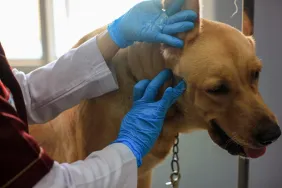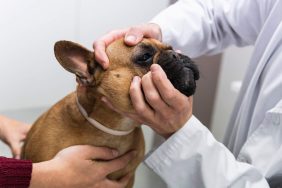Inflammatory Skin Disease in Dogs: Symptoms, Causes, & Treatments

Inflammatory skin disease in dogs is a condition involving a dog’s skin glands. Usually, it causes hair loss and scaly skin. Technically, the condition is known as sebaceous adenitis.
Thankfully, the condition is rare. Despite that, certain breeds are unfortunately predisposed to it. In particular, some of those breeds include Samoyeds, Standard Poodles, Akitas, Hungarian Vizslas, and even the Havanese.
If you see the signs of sebaceous adenitis in your dog, get to a veterinarian for a proper diagnosis and treatment. Until then, here’s what you should know about the symptoms, causes, and treatments for the condition.
Symptoms of Inflammatory Skin Disease in dogs
The condition produces a wide range of symptoms. Technically, long and short-haired breeds experience different symptoms of sebaceous adenitis.
@media (min-width: 0px) and (max-width: 749px) { .pb_prebidjs_300x250_a__wrapper { min-height: 250px; } } @media (min-width: 750px) { .pb_prebidjs_300x250_a__wrapper { display: none; } }
For example, some of the common symptoms for long-haired breeds include:
- Matted hair clumps, usually in small tufts
- Dull hair and brittle coat texture
- Skin lesions on the head and along the spine
- Diffuse alopecia, with symmetrical hair loss on each side of the body
- Redness
- Silvery or white scales on the skin, which may not easily flake off
- Hairline producing a smell
- In Akitas, a deep skin infection resulting in lethargy or sluggishness, fever, and even weight loss
Some of the common symptoms for short-haired breeds include:
- Skin scales along the back, ears, and head
- Patchy alopecia
- Bacterial infections are rarer in these breeds, but typically develop along the hairline in select cases
- Mild scaly skin
- Skin scarring
Causes of Inflammatory Skin Disease in dogs

At this time, the cause of sebaceous adenitis remains unknown. As such, this condition is typically referred to as being “idiopathic” in nature.
However, certain breeds seem to be predisposed to the condition. For instance, some of the long-haired breeds include:
- Poodle (in particular, the Standard Poodle)
- Akita
- Samoyed
- Springer Spaniel
- German Shepherd Dog
- Havanese
- Lhasa Apso
The list of short-haired breeds susceptible to sebaceous adenitis includes:
- Miniature Pinscher
- Beagle
- Dachshund
- Vizsla
Additionally, younger and middle-aged adult dogs suffer from the condition to the greatest degree.
Treatments for Inflammatory Skin Disease in dogs
First, your vet will ask about your dog’s symptoms. Secondly, your vet will ask about your pup’s full medical history. Afterwards, your provider will attempt to rule out other skin conditions, including ringworm. Resultantly, endocrine tests and skin scrapings may be utilized to assist in this process.
One of the more challenging aspects of the condition is that symptoms may disappear and reappear, independent of any course of treatment. Accordingly, a skin biopsy will likely be required to guarantee an accurate diagnosis of sebaceous adenitis.
Ultimately, treatment will depend on the severity of the condition. Also, long- and short-haired dogs will need different treatment. For example, special shampoos can help in some cases. Other topical therapies — including specialty sprays and mousses — may also promise relief and reduce skin flaking in dogs with this condition. Alternatively, antibacterial products might be needed.
Some veterinarians may opt to prescribe medication for dogs suffering from atopic dermatitis or other skin conditions. In this case, your vet may advise you to start your pet on Cyclosporine, which is also known by the brand names Atopica and Optimmune. Prednisone may also be prescribed.
Additionally, vitamin A and E supplements can help. Your vet will recommend safe dietary supplements for your dog’s needs.

Mange in Dogs: Types, Symptoms, Causes, & Treatments

Abscesses in Dogs: Symptoms, Causes, & Treatments

Atopic Dermatitis in Dogs: Symptoms, Causes, & Treatments

Skin Fold Dermatitis (Intertrigo) in Dogs: Symptoms, Causes, & Treatments




